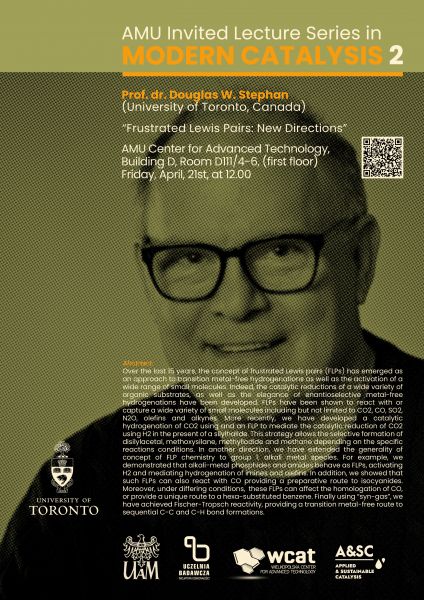Serdecznie zapraszamy na piąty wykład z cyklu AMU Invited Lecture Series in MODERN CATALYSIS 2, który wygłosi prof. dr. Douglas W. Stephan z University of Toronto z Kanady. Wykład odbędzie się w formie stacjonarnej.
(Link do strony grupy badawczej: http://www.chem.utoronto.ca/staff/DSTEPHAN).
Wykład pt. „Frustrated Lewis Pairs: New Directions” odbędzie się w piątek, 21 kwietnia 2023, o godz. 12.00 w Centrum Zaawansowanych Technologii, w sali seminaryjnej D111/4-6 (pierwsze piętro).
Prof. dr. Douglas Stephan jest naukowcem rozpoznawalnym na całym świecie. Jego dorobek naukowy przekracza 540 artykułów, które cytowane były ponad 40 000 razy (indeks Hirscha = 88 (Web of Scinece), 99 (Google Scholar)). Publikuje w takich czasopismach jak Science, Chem. Rev., Chem. Soc. Rev., Angew. Chem. Int. Ed., ACS Catal., J. Amer. Chem. Soc., Nature, Chem. Commun. Zajmuje się szeroko pojętą katalizą i chemią pierwiastków grup głównych, a zwłaszcza zastosowaniem tzw. „Frustrated Lewis Pairs (FLP)” w syntezie zaawansowanych strukturalnie związków organicznych i metaloorganicznych. Warto podkreślić, iż prof. Stephan jest aktualnie głównym edytorem czasopisma Chemical Communications, a wcześniej przez kilka lat był edytorem prestiżowego Chemical Society Reviews.
Douglas W. Stephan, born in Hamilton, grew up in the Hamilton suburb of Stoney Creek. He attended McMaster University where he obtained his Bachelor of Science Degree in 1976 (summa cum laude). Afterwards, he began his Ph.D., studies in Chemistry at the University of Western Ontario with an NSERC of Canada postgraduate fellowship. Upon completion of his Ph.D. in 1980, he became a NATO Postdoctoral Fellow with Prof. R. H. Holm at Harvard University. In 1982, he became an Assistant Professor at the University of Windsor and quickly rose the ranks becoming a Full Professor in 1992 and University Professor in 2002. In 2008, he took up a position as Professor of Chemistry and Canada Research Chair in Inorganic Materials and Catalysis at the University of Toronto. The Canada Research Chair was renewed in 2015 and in 2018 he was named a “University Professor” at U of T. He was an Einstein Visiting Fellow at TU-Berlin from 20216-2019 and in 2020, he established an additional satellite laboratory at Ningbo University as a Zhedong Scholar Chair Professor. He was an Associated Editor for Chemical Society Reviews for 6 years, the Chair of the editorial board and is now Chair of the editorial board of Chemical Communications. He also sits on the Editorial board of the Royal Society (UK) journal, Philosophical Transactions A and on the advisory board for the Berlin-Potsdam cluster of excellence in catalysis. In his independent research career, Stephan has published over 540 scientific articles with over 300 papers since 2008. He has given over 320 invited lectures. His research has led to major fundamental advances in chemistry and had a practical impact on commercial processes. Stephan’s papers have been exceptionally highly cited with over 40000 citations, a remarkable level for an inorganic chemist. The innovative and pragmatic nature of his work is evidenced by ca. 90 patent applications filed by industrial partners. He has trained more than 65 PhD and MSc students, and over 65 postdoctoral fellows in addition to over ca 150 undergraduates. He was honored with many awards and distinctions, e.g., F.A. Cotton Award in Synthetic Inorganic Chemistry (ACS, 2022), Centenary Prize (RSC, UK, 2021), Guggenheim Fellowship (John Simon Guggenheim Memorial foundation USA, 2020), Thomson Reuters Highly Cited Researcher (top 1% of all scientists) (2014-2019), Thomson Reuters, Most influential scientific minds (2015), Applied Catalysis Award (RSC, UK), Corresponding Member of North-Rhein-Westfaelia Academy of the Sciences and Arts (Germany, 2014), Honorary Member of the Israeli Chemical Society (2013).
Spotkanie to jest okazją do zgłębienia niesamowicie interesującej dziedziny katalizy opartej o układy FLP, a także do wysłuchania na żywo głównego edytora Chem. Commum., jednego z najbardziej rozpoznawalnych naukowców w zakresie katalizy na świecie. Serdecznie zapraszam i zachęcam do licznego udziału w tym wykładzie.


